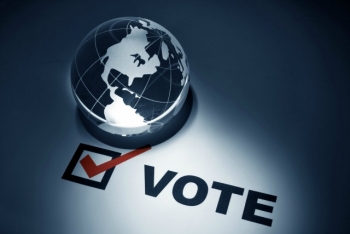
REGULATIONS
Jury out on Trump plan — 'politically naive' or 'creative'?
Arianna Skibell, E&E News reporter
Published: Friday, November 11, 2016
A top priority for President-elect Donald Trump is a highly contentious regulatory reform plan that is receiving mixed support from veteran regulators.
Trump has said that on his first day in office, he will push a measure that would eliminate two federal rules for every new one. The "one in, two out" proposal ranks third on his day one to-do list, behind a constitutional amendment to impose congressional term limits and a hiring freeze on all federal employees.
Under current procedures, federal regulators have little incentive to study existing regulations and throw out the ones that are outdated or not achieving their intended effect, according to John Graham, who served as administrator of the Office of Information and Regulatory Affairs (OIRA) in the White House Office of Management and Budget during the George W. Bush administration.
Regulators generally prefer to invest their energy in making new regulations, not examining old ones, he said in an email to E&E News.
"The Trump proposal appears to be a creative procedure for fostering more agency scrutiny of existing rules," he said.
James Goodwin, a policy analyst at the Center for Progressive Reform, said agencies actually do a pretty good job of reviewing old regulations, and Trump's proposal would do more harm than good.
"It's a blunt tool for blocking public safeguards, for undermining people's access to clean drinking water, for denying people the right to clean air," he said.
Instead of imposing regulatory "budgeting," as it's called, agencies should be given more resources to review regulations, and the rulemaking process should be simplified, Goodwin said.
"The policy goal should be good regulations, not fewer regulations, not more regulations," he said. "The regulatory budgeting completely ignores that debate. It's not concerned with the quality of regulations — it's concerned with the quantity. Which is foolish."
The application of fiscal budgeting concepts to regulation was proposed in President Carter's "Economic Report of the President" as a way to understand the total financial burden imposed by regulations and to reduce it. Congress has held numerous hearings over the years to examine the approach.
Susan Dudley, who oversaw executive branch regulations as OIRA administrator under President George W. Bush from 2007 to 2009, said there are many challenges to applying budgeting tools to improve regulatory transparency and accountability, but also some benefits.
"I think a full regulatory budget, trying to make it similar to the fiscal budget, would be really hard. Regulations aren't as measurable," said Dudley, who currently serves as the director of George Washington University's Regulatory Studies Center.
Still, Trump's proposal, she said, has its merits.
"I think it might help with incentives. We would do a better job evaluating what really works," Dudley said.
She noted that similar measures have been implemented in Canada and the United Kingdom, with varying degrees of success.
Rob Verchick, an expert in environmental regulation, said the notion that mounting and costly regulations are hurting the economy does not take into consideration their net benefit.
"I think it's a terrible idea," he said of Trump's plan. "The problem with the 'one in, two out' idea is that it doesn't pay any consideration to the benefits the regulation might provide to the public, the net benefits."
Verchick, a former policy administrator for U.S. EPA, said air quality regulations, for example, save hundreds of millions of dollars every year by preventing illness and death.
Jerry Ellig, a senior research fellow at the free market-oriented Mercatus Center at George Mason University, said it may be possible to reduce regulations without impairing public safety.
In a study this year in the Review of Industrial Organization, Ellig and a colleague found that after partial economic deregulation of railroads in 1980, additional regulatory restrictions were associated with little or no change in safety.
"So it appears that, at least for railroads, we have reached the point where more regulation does not deliver more safety, and a little less regulation probably wouldn't impair safety," he said.
But, Ellig added: "Of course, we are only looking at the number of regulatory restrictions. It would take more work to identify which particular safety regulations are the ineffective ones. That is the work we need to motivate agencies to do."
'An alarming position'
Still, Verchick said the process of eliminating federal regulations is itself costly, labor-intensive and potentially illegal in some instances.
"Agencies can't just erase a regulation once it's written. It has to produce a factual record, often a scientific justification and legal justification for doing so," he said. "So it's a regulation that removes the regulation, and that has to go through a formal comment period and then could be the subject of litigation.
"If you're going to remove an old rule, you have to make a legal case justifying it. And that's hard to make if you're doing it just for political reasons," he said.
Verchick also noted that Trump doesn't seem to understand that this level of "housecleaning" would take an enormous bureaucratic effort.
"And so you're not going to do this by freezing the number of people in the federal workforce," he said, referencing Trump's second day-one objective.
Graham, who called Trump's plan creative, agreed with this point, saying the measure would require OMB to oversee the process and "hold the feet of regulators to the fire."
"OMB and some agencies may need some additional staffing to analyze existing regulations," he said.
And, Verchick noted, some regulations are required by law and cannot be rolled back without legislation.
Still, implementation of a proposal that prioritizes safeguards could be disastrous, Goodwin said.
"So what do we do? Do we not limit the amount of salmonella in chicken so we can protect ourselves against self-driving cars?" he said. "That's an alarming position to take."
Twitter: @AriannaSkibell Email: askibell@eenews.net
